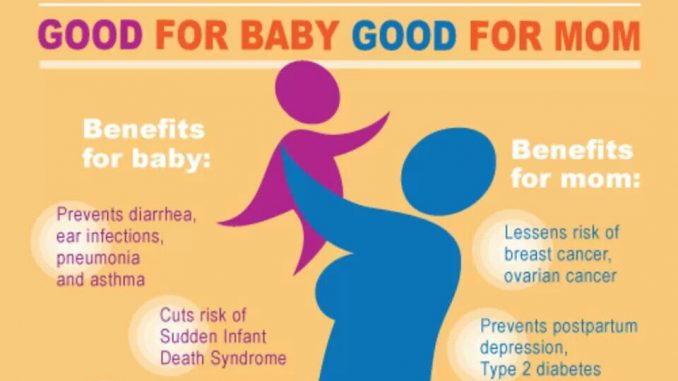
What is Breastfeeding?
- Simply, breast feeding means feeding breast milk to the young child
- It is an act of feeding a young child with breast milk/human milk/mother’s milk
- Breast feeding is an ideal nutrition for infant and young child
- Breast feeding is also known as lactation/nursing
- It should be done for the first 2 years of life (i.e. 24 months).
- The duration of breast feeding can be divided as:
- Exclusive breast feeding for 0-6 months (180 days)
- Continued breast feeding along with complementary feeding up to 24 months of life or more
- Every year World Breast feeding Week is celebrated from August 1-7 in order to increase awareness and practice of breast feeding
What is Colostrum?
- When it comes to breast feeding, we cannot and should not forget about colostrums.
- Colostrum is the first milk which is thick and yellowish in color and is very special for the growth and development of the baby
- Colostrum is important because :
- It is most important nutrition for baby in the first few days of life
- It has anti-bacterial, anti-viral agents and various antibodies which protects against different infection and allergies
- It helps to release bilirubin from the child’s body which helps to prevent the child from jaundice
- Contains nutrients which promotes the maturation of the gut and thus helps in good digestion
- Also contains protein, vitamin A and other micro nutrients for the growth and development of the baby
- It also forms a protective coat in the GI tract, thus preventing harmful bacteria and allergy from crossing into the baby’s blood
What is Exclusive Breast feeding?
- Exclusive breast feeding means giving only breast milk to a infant with complete exclusion of any other food/drinks, not even water
- Exclusive breast feeding should be done for 1st six months of life i.e. 0-6 months (180 days)
- Although no other food items should be given during the 1st six months; medicines, drops and syrups consisting of vitamins and minerals are allowed/can be given
Importance of Breast feeding
- Breast milk contains the right balance of all the vitamins, minerals and other nutrients required for the proper growth and development of a baby
- It enhances sensory and cognitive development of young child
- It fulfills all sorts of nutritional need of the child for the first six months, covers 50% or more nutritional need in the second half of the 1st year of life and covers 1/3rd of the nutritional need during the second year of life
- Breast feeding contains immunoprotective components which provide special protection to the immune system of the baby. Moreover, presence of antibodies in the breast milk fight against different bacteria and viruses
- Breast milk contains all sorts of nutrients, hormones and various disease fighting compounds. Thus decreases the risk of having asthma, lower respiratory infections, diarrhea, vomiting and other allergies.
- It acts as the 1st vaccination for the child
14 Advantages of Breast feeding to the baby
- It is readily available, completely sterile and safe
- It is easily digestible for the infant
- Protects the child against different sorts of common childhood infection and illnesses and allergies
- Increases bonding between the mother and child
- It increases physical, mental and psychological growth and development of a child
- Breast feeding also increases the productivity and performance of a child. These child also have better cognitive development and has higher IQ
- Furthermore, it reduces the risk of malnutrition along with non-communicable diseases like heart disease, diabetes, obesity etc in later stages of life

- Some research also suggest that breast feeding plays a vital role in prevention of SIDS (Sudden Infant Death Syndrome)
- It reduces stomach upset/gastroenteritis, diarrhea and constipation
- Breast feeding also reduces the risk of ear infections, meningitis etc
- Breast fed babies have better oral development due to their jaw movement. Likewise, they also have reduced chances/risk of tooth decay due to the presence of ideal nutrients in breast milk
- These babies are also less likely to suffer from childhood obesity and obesity in adulthood as well
- Breast feeding also increases the recovery of sick child
- It also enhances vaccine response
9 Advantages of breast feeding to mother and family
- Sucking by a baby during breast feeding contracts the uterus and helps it to come back to its normal size
- Breast feeding also reduces uterine bleeding after birth
- Exclusive breast feeding every 4-5 hours days and night acts contraception for newly delivered mothers. This method of contraception is also known as Lactation Amenorrhea Method (LAM)
- Breast feeding reduces the risk of ovarian cancer, breast cancer, osteoporosis etc
- Breast feeding saves the time of mother to prepare safe and adequately nutritious food for her baby
- It is completely economical and reduces the resource load for the family
- In most of the cases, breast feeding also helps mother to lose weight by burning extra calories and helps them to achieve their pre-pregnancy weight and figure
- It also increases the bonding between mother and baby
- Reduced cost and expenditure for baby’s food and nutrition
References
http://www.who.int/nutrition/topics/infantfeeding_recommendation/en/
http://www.who.int/nutrition/topics/exclusive_breastfeeding/en/
http://www.parents.com/baby/breastfeeding/
https://www.babycenter.com/breastfeeding
https://medlineplus.gov/breastfeeding.html
https://www.cdc.gov/breastfeeding/
https://www.babycentre.co.uk/a613/breastfeeding-for-beginners
https://www.babycentre.co.uk/a613/breastfeeding-for-beginners
http://www.webmd.com/parenting/baby/nursing-basics
http://www.nhs.uk/Conditions/pregnancy-and-baby/Pages/benefits-breastfeeding.aspx
https://www.womenshealth.gov/breastfeeding/making-decision-breastfeed
https://www.whattoexpect.com/first-year/breastfeeding/basics/
https://www.fitpregnancy.com/baby/breastfeeding/20-breastfeeding-benefits-mom-baby
https://www.babycenter.com/0_how-breastfeeding-benefits-you-and-your-baby_8910.bc
https://www.lansinoh.com/en/resources/11-benefits-of-breastfeeding-for-baby
http://www.wahm.com/articles/9-advantages-of-breastfeeding.html
http://www.momjunction.com/articles/advantages-of-breastfeeding-for-you-and-your-baby_0080932/#gref
http://kellymom.com/pregnancy/bf-prep/bf-benefits/
http://www.telegraph.co.uk/news/uknews/11274127/Why-breastfeed-The-benefits.html
http://www.who.int/maternal_child_adolescent/topics/child/nutrition/breastfeeding/en/
https://www.theatlantic.com/health/archive/2012/04/the-benefits-of-breastfeeding/255206/
http://www.tensteps.org/benefits-of-breastfeeding-for-the-infant.shtml